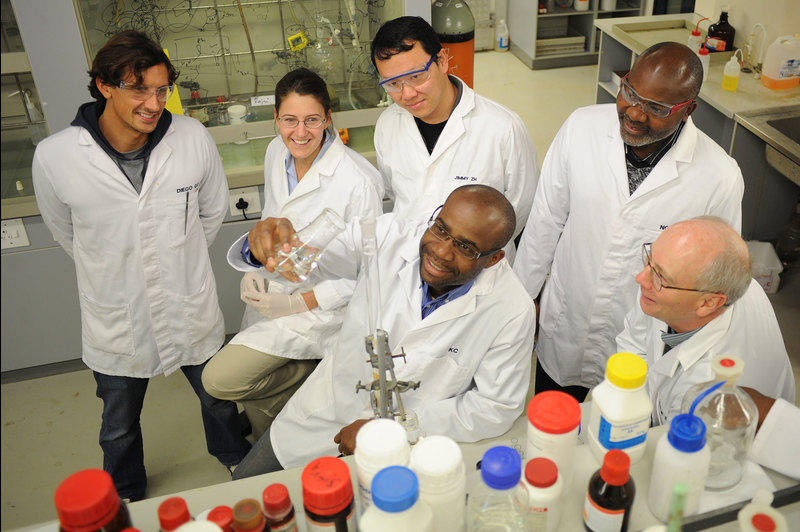UCT’s H3D secures significant partnerships to fast-track work in Africa
07 June 2021 | Story Staff Writer. Photo UCT News. Read time 6 min.
The University of Cape Town’s (UCT) Holistic Drug Discovery and Development Unit (H3D) recently entered into two important strategic partnerships. These collaborations will assist the unit with developing new tools to advance treatment outcomes for the African patient population, and enable capacity building in artificial intelligence (AI) and machine learning (ML) to aid drug discovery in Africa.
The H3D was set up to bridge the gap between laboratory and patient. The unit integrates medical chemistry, biology and pharmacology, as well as drug metabolism and pharmacokinetics studies. It is the first and only centre of its kind on the African continent, and one of the rare integrated drug-discovery centres established in an academic environment worldwide.
The power of partnership
One of the centre’s most recent partnerships – with Yemaachi Biotechnology, a leading African cancer research company – aims to “exploit African genetic diversity” by identifying new therapies and platforms to optimise cancer treatment for Africans.
“We at Yemaachi are very excited about this opportunity to partner with H3D. Not only is the project one of great importance to healthcare in Africa, but such partnerships are crucial to the development of scientific capacity on the continent – Africans working together to solve African problems,” said Yemaachi CEO Dr Yaw Bediako.
Part of the partnership will include collecting patient information and specimens in a bid to gain a better understanding of the pharmacogenomics (studying the role of the genome in drug responses) of African populations, and cancer’s genetic landscape among Africans. This work will inform Yemaachi Biotechnology’s precision medicine projects. The partnership will also benefit from H3D’s expertise in drug metabolism assays, to help scientists identify the genetic variations specifically associated with liver cancer among Africans.
“Because of the lack of clinical trials performed in Africa, therapies are not typically optimised for the African patient population.”
Subsequently, the African Liver Project has been earmarked as the first joint endeavour. The project will leverage H3D’s pharmacology expertise and Yemaachi’s genomics and computational biology to understand how drug metabolism varies across the continent, with the ultimate aim of optimising treatment regimens for Africans. The variations in drug metabolism are said to contribute significantly to adverse drug reactions (ADR). Africa carries a high burden of ADRs, owing partly to the use of poorly optimised drugs as well as to high levels of genetic diversity.
According to H3D director Professor Kelly Chibale, because of the lack of clinical trials performed in Africa, therapies are not typically optimised for the African patient population. This, he explained, results in variable treatment outcomes.
“Among [the] many factors accounting for this is genetic variability in the activity and expression of drug-metabolising enzymes and transporters,” said Professor Chibale.
“This partnership with Yemaachi will ultimately inform patient stratification and dose selection for phase two and three clinical trials for specific existing and new cancer medicines used in Africa.”
AI and ML to aid drug discovery
Meanwhile, the centre has also collaborated with Ersilia Open Source Initiative (EOSI), a non-profit organisation (NPO) that supports research into infections and neglected diseases. The NPO’s primary objective is to facilitate the use of AI tools to accelerate the development of new medicines.
In addition to discovering new medicines for diseases such as malaria, tuberculosis (TB) and antibiotic-resistant microbial diseases that predominantly affect the African population, H3D is also focused on developing technology platforms that allow for medicines to be customised to the needs of African patients. Thus, the partnership provides a unique opportunity to apply cutting-edge biological data and computational analysis to H3D’s suite of experimental expertise. In addition, it aims to facilitate the cross-pollination of new ideas, skills and techniques.
“H3D is arguably the best possible partner when it comes to antimicrobial drug discovery.”
“H3D is arguably the best possible partner when it comes to antimicrobial drug discovery. We are delighted about this opportunity. World-class laboratory data and access to experimental validation is rarely accessible to emerging initiatives like ours,” said Dr Miquel-Duran Frigola, EOSI co-founder and chief scientific officer.
But the key objective, Chibale said, is to develop AI and ML models tailored to key assays in H3D’s malaria and TB drug discovery pipelines, and to arrange these in a virtual screening cascade form. This, he explained, means that large chemical libraries can “filter through” this cascade, prioritise compounds, and in turn, reduce the attrition rate of the actual experimental pipeline.
The partnership with EOSI and others will also help to introduce predicative modelling of drug metabolism in livers [types] and microbiomes specific to the African population, he said. This will lead to better understanding of metabolism and drug disposition in African patients, to optimise dosing and minimise adverse effects.
“We are excited about this partnership with Ersilia, as we look to develop a multi-disciplinary platform based on AI and ML for accelerating the delivery of clinical candidates at H3D. This technology will nicely augment our in-house abilities and skills,” he said.
 This work is licensed under a Creative Commons Attribution-NoDerivatives 4.0 International License.
This work is licensed under a Creative Commons Attribution-NoDerivatives 4.0 International License.
Please view the republishing articles page for more information.










